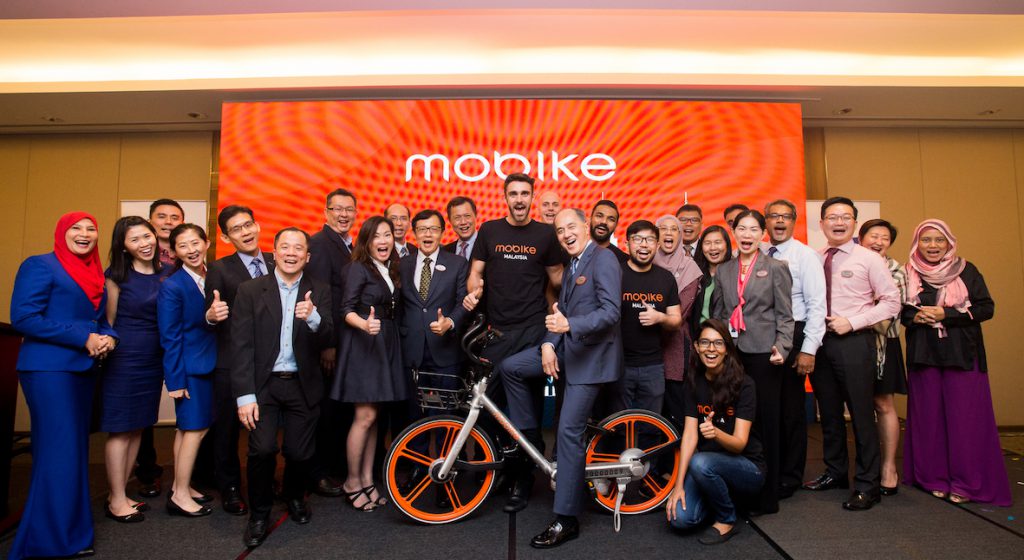We knew that it was just a matter of time before Mobike would wheel their way onto Malaysian streets after rival ofo padlocked a segment of the Malaysian market. And that’s exactly what they did one month into ofo’s Malaysian entry.
This time around, they consider themselves a smart bike-sharing company, through their newly minted partnership with Foxconn Technology Group—a manufacturing technology services company.
This Malaysian move also comes at the heels of their Thailand entry last year, perhaps owing to their increased production from their dalliance with Foxconn.
Slowly but surely, these bike-sharing startups clearly have global domination in their minds.
Which leads us back to Malaysia.
With two major players—ofo and oBike—already making their way across the country, does Mobike actually have something new to offer for Malaysians?
We got in touch with Chris Martin—not of Coldplay fame—but the VP of International Market Expansion of Mobike who dropped by Malaysia for the launch of the bikes here.
Of course, they gave us the usual talk of helping the last-mile journeys, and eco-friendliness touted by most ride-sharing companies.

But Chris also informed us that, “Mobike is the only true smart bike platform, leveraging proprietary technology to create a sophisticated and highly adaptable solution to the last mile transport challenge.”
This technology includes:
- Smart-lock and built-in GPS connected to a Mobike IoT network that helps them track bike health and manage supply.
- Collecting and analysing big data through Mobike’s AI named “Magic Cube”. This can help city planners figure out the infrastructure and operations of introducing biking into a community.
Their Magic Cube, according to Mobike’s press release, “is a vital feature for cities, which no other bike-sharing company provides”.
As for their IoT connectivity, Chris tells us that:
“Each bicycle is connected to Mobike’s IoT network via GPS-embedded smart lock, forming one of the largest IoT networks on the globe. This advanced technology means that we have the ability to quickly and effectively deploy our assets to meet consumer demand—nobody else can do this.”
As for the bikes themselves, according to Chris, their innovations include chainless bikes (similar to fixies), lightweight aluminium frames that—according to Mobike—are rust-free, more durable disk-brakes, and an automobile-inspired five-spoke wheel.
All of this translates to maintenance-free bikes that Mobike anticipates to last 4 years on the streets before someone has to come in with a wrench.
As for the price, Mobike’s deposit so far runs the highest at RM99, though they’re currently offering it at RM9 to Malaysians for their promotional period. They’re also offering the first month for free.
Consequent months will see rides costing RM1.50 per 30 minutes.
We also have to ask: are too many bikes coming into Malaysia?
The issue of bike vandalism has been covered pretty extensively, but as we can see from the track record set by the previous two players so far, bike vandalism hasn’t been too rampant in Malaysia.
What may be of more concern instead? If having too many bike players in Malaysia cause a large, unmanageable influx of bikes littered around.

Today, while walking in KL City, we already have to dodge around to avoid irresponsibly parked bikes. Are more players actually a good thing?
“This is unfortunately a problem we observe to have been created by our competitors, and unhelpful, as it causes reputational issues for the industry as a whole. However, that model isn’t sustainable and we expect that over time only companies with advanced technology and well-managed business models like ours will survive.”
Chris claimed that their technology is so far, the most sophisticated in the market, where they can tell where all their bikes are at any time. This allows them to both track supply and demand, as well as identify and address problems.
“Also, we have very valuable data on travel and transport needs, and we work closely with regulators locally and nationally to address cities’ transport challenges.”
How quickly they’re able to address issues in Malaysia will remain to be seen, but it’s worth noting that their expansion into areas like Manchester, as well as the initial China, did leave them with some growing pains.
Chris said that “We do not foresee supply exceeding demand in Malaysia. Being a responsible member of the community and properly managing our assets is a priority.”
“We recently began implementing our ‘Mobike Hub’ Smart Mobike Preferred Location (sMPL) system—dedicated parking zones that have low-powered Bluetooth technology supporting sub-meter level positioning so that we can monitor the real-time locations and overall status of our bikes within the zones, and encourage riders to park responsibly.”
They also incentivised their China mainlander riders with credit for good behaviour, when they “rescue” abandoned bikes.
In parnership with SP Setia, a Malaysian real estate developer, Mobike will first be deployed in Shah Alam.
As for further expansion, Mobike is going to be thoughtful of where they embark.
“In terms of roll out into other cities, we’ll take each city and area on its own merits, and will first work on understanding where Mobike makes most sense, and then collaboratively implement our platform in the most responsible and considered manner,” said Chris.
They also hired a local team here in Malaysia who understand our needs and culture to figure out their local strategies.
And there you have it. With three players already in the field, not to mention the existing, though lower-tech bike rental options already available in Malaysia, seeing bicycles everywhere you look is going to be a mainstay in Malaysia for a while.
Based on our limited observations, bike-sharing is seeing an increase in traction among Malaysians, perhaps as a result of these companies’ efforts in education and making their bikes available.
Could having so many players finally bring the biking culture back into urban Malaysia?
Again, only time will tell.
Feature Image Credit: Mobike













